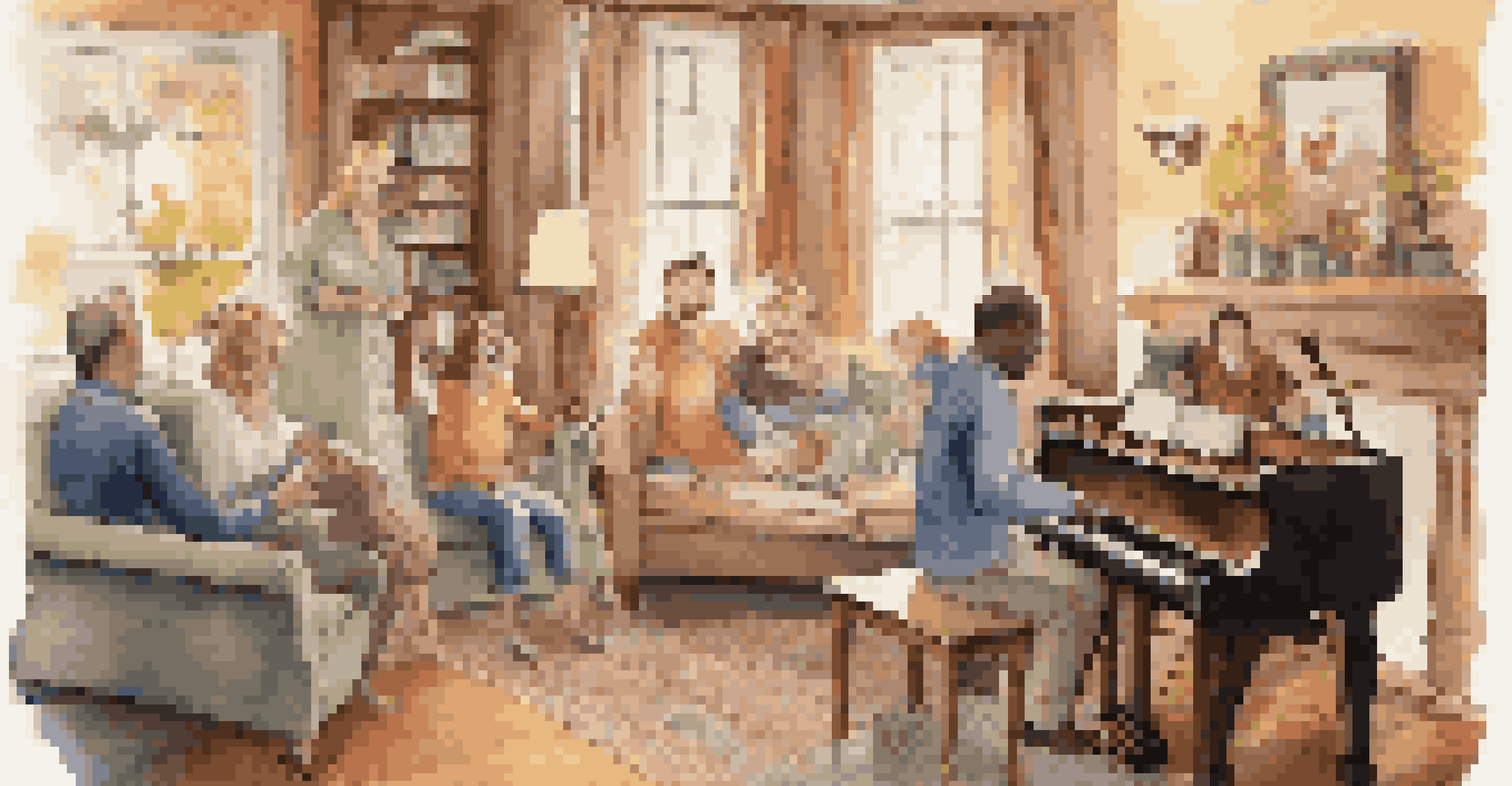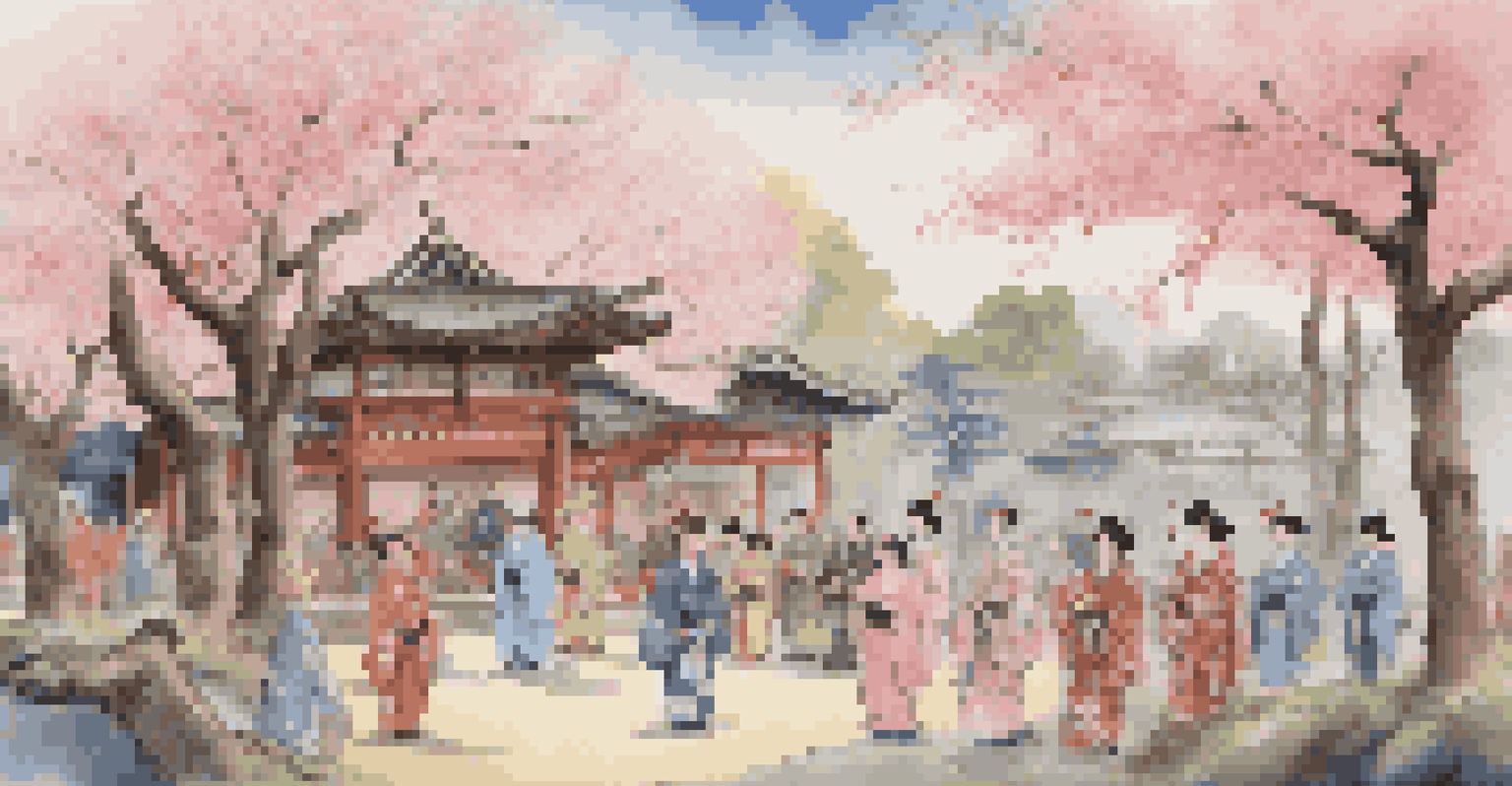Exploring the Relationship Between Music and Humor in Cultures

Understanding Music and Humor as Cultural Expressions
Music and humor are universal forms of expression that transcend language barriers, each offering unique insights into a culture's values and beliefs. They often reflect societal norms and can either reinforce or challenge these constructs. For example, folk songs often contain humorous elements that critique local customs, illustrating how intertwined these art forms can be.
Music can change the world because it can change people.
Just as music can evoke deep emotions, humor often serves as a release valve for cultural tensions. In many societies, comedic songs can address sensitive issues, using humor to broach topics that might otherwise be difficult to discuss. This dual role of music and humor highlights their significance in cultural dialogues.
Moreover, both music and humor adapt over time, reflecting changes in cultural attitudes. As societies evolve, so do their musical and comedic styles, making them fascinating subjects for cultural studies. Understanding their interplay sheds light on how communities navigate their identities and experiences.
The Role of Music in Enhancing Humor
Music often acts as a catalyst for humor, enhancing comedic timing and delivery. Think of the subtle background scores in sitcoms or the playful jingles in commercials; they elevate the comedic effect and engage the audience. This synergy between music and humor creates a unique atmosphere that can amplify laughter.

Additionally, musical elements such as rhythm and melody can make jokes more memorable. A catchy tune can turn a simple punchline into a sing-along, ensuring that the humor sticks in the audience's mind. This phenomenon is evident in children's songs, where humor and music combine to create enjoyable learning experiences.
Music and Humor Reflect Culture
Both music and humor serve as lenses through which we can understand and critique societal values and norms.
In live performances, musicians often incorporate humor into their routines, using musical interludes to set up jokes or engage the audience. This interactive element fosters a sense of community and shared experience, making the humor more relatable and enjoyable. It's a reminder of how laughter and music can bring people together.
Cultural Variations in Musical Humor
Different cultures exhibit unique styles of musical humor, shaped by their historical and social contexts. For instance, in American culture, stand-up comedians often use rhythmic storytelling, blending music with punchy jokes to create a distinct comedic style. This reflects a cultural penchant for improvisation and spontaneity.
Humor is the shortest distance between two people.
Conversely, in cultures like Japan, humor can be more subtle, often relying on wordplay and situational comedy enhanced by traditional music. The interplay between the two can create a rich tapestry of entertainment that resonates deeply with local audiences. This cultural specificity illustrates how humor and music adapt to societal norms.
Understanding these variations provides insight into the values and humor of different cultures. For example, the use of satire in political songs can reveal societal tensions, while playful tunes in children's music can foster community bonding. This diversity enriches the global landscape of comedy and music.
The Psychological Impact of Music and Humor Together
Research shows that both music and humor can have positive effects on mental health, often working synergistically to enhance well-being. Engaging with both can boost mood, reduce stress, and even encourage social connections. For many, attending a comedic musical performance can be an uplifting experience that fosters joy and camaraderie.
The laughter evoked by humorous songs can trigger the release of endorphins, the body's natural feel-good chemicals. This physiological response can create a sense of euphoria, making people more receptive to positive experiences. When combined with music, humor becomes a powerful tool for emotional release.
Technology Shapes Musical Humor
Digital platforms have transformed the creation and sharing of musical humor, allowing diverse voices to reach global audiences.
Moreover, the shared experience of enjoying music and humor can strengthen social bonds. Whether it's singing along to a funny song with friends or laughing at a comedic musical, these moments create lasting memories. This interconnectedness highlights the profound impact of music and humor on our lives.
The Influence of Technology on Musical Humor
In today's digital age, technology has transformed how we create and share musical humor. Social media platforms allow for rapid dissemination of funny songs and parodies, making them accessible to a global audience. This democratization of content has led to a new wave of comedic talent emerging from diverse backgrounds.
Platforms like TikTok and YouTube have become hotspots for viral musical humor, where users blend original compositions with comedic elements to entertain millions. These short-form videos often combine catchy tunes with relatable humor, showcasing the evolving relationship between music and comedy in a fast-paced world.
This technological shift also allows for the fusion of different cultural elements, creating hybrid forms of musical humor. For instance, a hip-hop track might incorporate traditional folk melodies, infusing humor and cultural references from various backgrounds. This blending enriches the cultural landscape and fosters cross-cultural dialogue.
The Future of Music and Humor in Cultural Contexts
As society continues to evolve, the relationship between music and humor will likely adapt to new cultural influences and technological advancements. Emerging genres and styles will reflect the changing dynamics of humor, offering fresh perspectives on traditional narratives. This evolution presents an exciting opportunity for artists to experiment with new forms of expression.
Furthermore, the global interconnectedness brought about by technology will continue to influence how music and humor are perceived and enjoyed. Cross-cultural collaborations may lead to innovative comedic styles that blend elements from different traditions, enriching the global landscape of entertainment. This fusion can create a deeper understanding of diverse cultures.
Music and Humor Boost Well-Being
Engaging with music and humor together can enhance mental health, fostering joy and social connections.
Ultimately, the enduring connection between music and humor will remain a vital part of human experience. As we navigate an increasingly complex world, these art forms will provide solace, laughter, and a sense of community. Their ability to resonate across cultures will ensure that they continue to thrive in the future.
Conclusion: Celebrating the Bond Between Music and Humor
In summary, the relationship between music and humor is a fascinating exploration of cultural expression and shared experiences. Both art forms serve as reflections of societal values while simultaneously creating connections among individuals. By understanding their interplay, we gain insights into how cultures navigate their identities and histories.
The unique ways in which different cultures blend music and humor reveal the richness of human creativity. These art forms not only entertain but also foster understanding and empathy across diverse backgrounds. They remind us that, at the heart of it all, laughter and music are essential components of the human experience.

As we celebrate the bond between music and humor, let's appreciate their power to uplift, unite, and inspire. Moving forward, embracing this connection can lead to a more harmonious world, where laughter and melody intertwine, enriching our lives and communities.